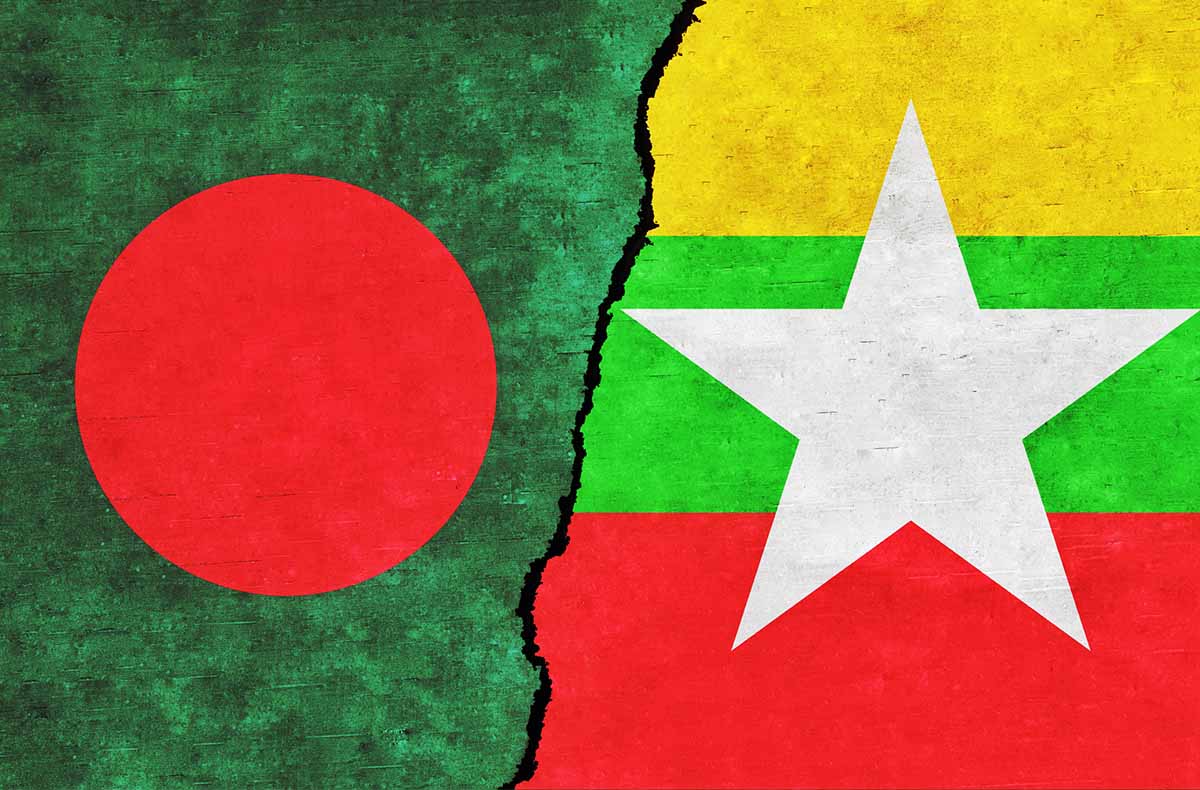
[Can Bangladesh-Myanmar Look Beyond the Rohingya Crisis? Part 1]
While partnerships in trade, commerce, agriculture, and environmental conservation seem feasible in today’s interconnected world, doubts persist about the feasibility of full-scale cooperation with Myanmar due to its brutal military regime. Thus, a complex interplay of potential opportunities and risks characterizes this situation.
The two sides of this coin—hope and uncertainty—coexist, creating a dynamic and delicate balance that may shape the future of this relationship.
For instance, the shared maritime boundary between Dhaka and Naypyidaw provides them with unobstructed access to the bountiful resources of the Bay of Bengal, presenting an opportunity to collaborate and delve into untapped sectors, particularly the flourishing tourism industry. However, the same fact stands in the way that a country with more than half a century under a military regime makes the situation unviable for tourism.
If Bangladesh sees a future with a collaboration with Myanmar in this sector, it may hamper the chances of Dhaka’s projected growth from the tourism industry. Therefore, vigilant consideration is necessary despite the potential for collaboration.
Besides, Bangladesh and Myanmar face common traditional and non-traditional security challenges like insurgency, transnational crimes, especially drug smuggling and human trafficking, and the potential threat of terrorism. In these circumstances, the two neighbors would conjointly address these issues, as most neighboring nations ensure collective security by adopting joint border patrols and coordinating naval exercises in their maritime boundaries. However, as for Dhaka-Naypyidaw, that is unlikely to happen.
Because the Rohingya crisis remains the single most significant security issue thus far, it demands to be addressed with utmost priority. Another reason is, the Myanmar Navy has been continuously encroaching on Bangladesh’s maritime boundaries, claiming territories such as Saint Martin, situated in the southern part of Bangladesh, as their own and frequently assaulting Bangladeshi fishermen while taking away their trawlers. Such occurrences have become routine in the sea, creating a precarious relationship between the two nations.
Though for building trust among the armed forces of the two sides, several regional experts propose military diplomacy as a possible avenue for achieving security cooperation; however, this initiative appears to be impractical in the face of the Rohingya crisis, which Myanmar’s Junta is solely responsible for creating.
How feasible will it be to cooperate with a country that already poses the most significant security threat in the region? Besides, Tatmadaw (Myanmar’s military) is already on the UN blacklist. Therefore any military cooperation with the genocider group may potentially tarnish the reputation of the Bangladesh military, a reputation built steadily by joining numerous UN peacekeeping missions around the world.
A closer examination of these aspects further reinforces the notion that the precarious state of solid cooperation between these neighboring countries persists due to the Rohingya crisis being overlooked.
In regional cooperation, SAARC is on the verge of collapse, leaving the Bay of Bengal Initiative for Multi-Sectoral Technical and Economic Cooperation (BIMSTEC) as the only viable option. As a member of the BIMSTEC and the Kunming Initiative, both countries have the chance to enhance collaboration and partnership to pursue common goals. Also, combined with Myanmar’s participation in ASEAN would create an additional opportunity for collaboration and growth, thereby settling the disputes.
Yet, that may not be feasible as the de facto military regime has entrenched itself deeply, making it challenging to envision a democratic government in Myanmar. Regional and international stakeholders like China, India, and Russia, subsuming a few ASEAN nations, are constantly championing this military regime despite a brutal genocide that occurred before the eyes of the world.
And in between the strategic interests, Bangladesh remains in the struggle with a handful of governments and their moral support to resolve the crisis.
Since its inception, this refugee crisis has been a subject of concern for the international community, with the US and EU among the most vocal advocates for its resolution. Other than this, the efforts of a significant number of democratic nations are still underway. Recent strides, such as the passing of the Burma Act in 2022 by the US Senate, which saw the confiscation of top Junta officials’ assets, and the latest UN Security Council Resolution last December, offer a glimpse of hope in a seemingly bleak situation.
Under such circumstances, if Dhaka were to opt for maintaining close bilateral ties with Naypyidaw while disregarding the Rohingya crisis, it could prove to be a costly mistake that would jeopardize not only the prospects for repatriation but also may challenge the competency of Bangladesh’s foreign policy.


